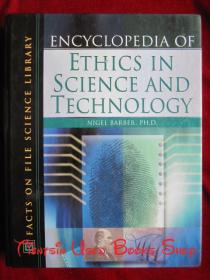
Encyclopedia of Ethics in Science and Technology(货号TJ)
¥ 286 ¥ 60 八五品
仅1件
天津河西
认证卖家担保交易快速发货售后保障
作者Nigel Barber
出版社Facts On File, Inc.
ISBN9780816043149
出版时间2002
版次1
印刷时间2002
印次1
装帧精装
开本28.6*22.5
纸张胶版纸
页数400页
定价60元
货号TJ2426-I003
上书时间2024-01-29
- 在售商品 暂无
- 平均发货时间 6小时
- 好评率 暂无
- 最新上架
商品详情
- 品相描述:八五品
- 商品描述
-
本书原定价60.00美元,净重1430克,馆藏自然旧。【图书分类:哲学、宗教 > 伦理学(道德哲学) > 伦理学理论与方法论 > 伦理学与其他科学的关系 > 道德与科学技术】Covers the central concepts, people, facts, phenomena, and controversies in the ethics of science and technology, as well as the seminal figures and formative ideas in the two fields.
With the emergence of many new branches of ethical debate and discourse in such areas as computer science, genetic engineering, and environmental sciences, there is an increasing need for a reference work that clearly outlines the many ethical issues in science and technology that have arisen in modern societies. Encyclopedia of Ethics in Science and Technology is the only single-volume resource to provide extensive coverage of such issues. Historically and internationally comprehensive, the encyclopedia features more than 400 entries that describe the varied ethical controversies in science and technology: laws, precedent-setting cases, regulations, agencies and organizations, ethical principles, concepts, people, and important events. Also covered are phenomena that are at the fringes of science but have important ethical implications, including voodoo deaths and experimental research into extrasensory perception (ESP). All entries are written in an objective manner, allowing readers to reach an even-handed understanding of these controversial issues. Coverage includes acid rain, Chernobyl nuclear accident, Darwin, electromagnetic radiation, ethics of care, fraudulent research, genetic engineering, Internet and information ethics, lead poisoning and neurological problems, organ donation, plagiarism, Rousseau, Three Mile Island nuclear accident, and video games/desensitization to violence.
Synopsis:
With the emergence of many new branches of ethical debate and discourse in such areas as computer science, genetic engineering, and environmental sciences, there is an increasing need for a reference work that clearly outlines the many ethical issues in science and technology that have arisen in modern societies. Encyclopedia of Ethics in Science and Technology is the only single-volume resource to provide extensive coverage of such issues. Historically and internationally comprehensive, the encyclopedia features more than 400 entries that describe the varied ethical controversies in science and technology: laws, precedent-setting cases, regulations, agencies and organizations, ethical principles, concepts, people, and important events. Also covered are phenomena that are at the fringes of science but have important ethical implications, including voodoo deaths and experimental research into extrasensory perception (ESP). All entries are written in an objective manner, allowing readers to reach an even-handed understanding of these controversial issues.
Coverage includes acid rain, Chernobyl nuclear accident, Darwin, electromagnetic radiation, ethics of care, fraudulent research, genetic engineering, Internet and information ethics, lead poisoning and neurological problems, organ donation, plagiarism, Rousseau, Three Mile Island nuclear accident, and video games/desensitization to violence.
From Library Journal:
Written by a psychologist who does research more in the area of human reproductive behavior (The Science of Romance), this slim, one-volume encyclopedia collects 400 articles covering the concepts, people, important events, and controversies associated with ethical issues in science and technology. Although coverage of such topics as stem-cell research, electronic privacy, and genetic engineering is to be expected, Barber also includes such curious choices as the Hubble Space Telescope, bridge collapse, and Thomas Edison, leaving the reader to wonder what the ethical dilemma is. Barber's writing is accessible to high school students, but he can give only a brief overview of each topic within the allotted space. In addition, he addresses the important topic of biomedical ethics in terms of technology only, so that abortion, for example, is discussed in the context of contraceptive technologies. Finally, gaps exist in the cross references and the index, e.g., there is no cross reference from abortion to RU-486 abortion pill. This could be a good source for students in search of a research topic or for quick, ready-reference answers (users will appreciate the small bibliography of two to six useful sources at the end of most entries). But beyond that, the book does not offer a great deal. Libraries may prefer a more authoritative resource such as The Concise Encyclopedia of the Ethics of New Technologies or the larger Encyclopedia of Applied Ethics. Teresa Berry, Univ. of Tennessee Libs., Knoxville
From Booklist:
From stem cell research to the Kyoto Treaty to land mines, our lives are intertwined with science and technology and the social and ethical controversies surrounding them. This work attempts to give a broad overview of the ethical issues surrounding the development of science and the deployment of technology. Although the goal is admirable, the choice of topics is somewhat random and superficial and often focuses more on debunking pseudoscience than on ethics.
The more than 400 entries range in length from 25 to more than 1,000 words and fall into five general categories: biography, legal aspects, specific technologies or theories, events, and movements and organizations. Some entries include brief lists of further reading, most of which is taken from secondary popular literature. The entries on philosophical concepts, such as Utilitarian ethics or Dual ism, do not provide a better or more relevant explanation than one would find in a basic philosophical or ethical reference work. Some biographical entries (e.g., Mendel, Gregor Johann) discuss ethical issues, but others offer only simple biographical information with little or no explicit ethical discussion. Other types of entries that are not well integrated into the theme of the book include one on UFOs, a very lengthy entry on the history of science, and entries that simply describe an event or experiment (e.g., Hubble Space Telescope, Catalytic converter).
The strength of the encyclopedia is its coverage of specific technologies and events and their controversial aspects. The author has done a good job of treating many of the technologies--such as contraception and genetic engineering--that we see in the daily news. The coverage is fairly evenhanded in addressing the claims of both the opponents and proponents of the technology in question. Useful cross-references to related articles also add value here. There is a helpful appendix listing organizations (with contact information) that treat ethical issues in science and technology.
Overall, this volume provides a decent introduction, and high-school and public libraries may want to consider adding it to their collections as a supplement to other resources. Academic libraries will find that larger, scholarly works such as The Encyclopedia of Ethics [RBB Ja 1 & 15 02] have adequate coverage of science and technology issues. RBB
— 没有更多了 —



















以下为对购买帮助不大的评价